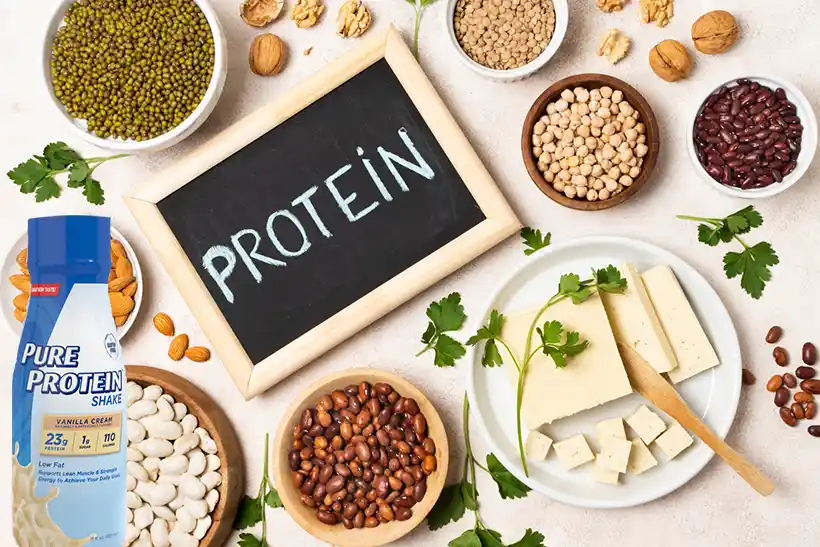Introduction
Welcome to WellHealthOrganic.com, your ultimate guide to holistic nutrition and wellness. Whether you’re a committed vegetarian or simply looking to incorporate more plant-based foods into your diet, understanding vegetarian protein sources is essential for maintaining a balanced and nutritious lifestyle. In this comprehensive guide, we’ll dive into the world of plant-powered protein, exploring a variety of delicious and nutrient-rich options to support your health and well-being. Let’s embark on a journey to discover the abundance of vegetarian protein sources available to nourish your body and delight your taste buds.
The Importance of Protein in a Vegetarian Diet
Protein is an essential macronutrient that plays a critical role in various bodily functions, including muscle repair, immune function, and hormone production. While animal products are often touted as the primary sources of protein, plant-based foods can provide ample protein to meet your daily needs. In fact, a well-planned vegetarian diet can offer all the essential amino acids necessary for optimal health and vitality.
Exploring Vegetarian Protein Sources
- Legumes: Beans, lentils, chickpeas, and peas are nutritional powerhouses packed with protein, fiber, vitamins, and minerals. These versatile legumes can be incorporated into a wide range of dishes, including soups, salads, stews, and burgers, providing a satisfying and nourishing meal.
- Tofu: Tofu, made from soybeans, is a versatile and protein-rich ingredient commonly used in Asian cuisine. With its mild flavor and adaptable texture, tofu can be marinated, grilled, stir-fried, or blended into smoothies, adding a nutritious boost to your meals.
- Tempeh: Tempeh is a fermented soy product that offers a nutty flavor and firm texture. It is rich in protein, probiotics, and essential nutrients, making it a popular choice for vegetarian dishes such as stir-fries, sandwiches, and grain bowls.
- Seitan: Seitan, also known as wheat gluten, is a high-protein meat substitute made from wheat protein. With its chewy texture and ability to absorb flavors, seitan is a versatile ingredient that can be seasoned and cooked in various ways, including grilling, sautéing, and baking.
- Quinoa: Quinoa is a gluten-free pseudo-grain that is rich in protein, fiber, and essential nutrients. As a complete protein source, quinoa can be used as a base for salads, pilafs, stuffed peppers, and breakfast porridge, providing a hearty and nutritious meal option.
- Nuts and Seeds: Almonds, walnuts, pumpkin seeds, chia seeds, and hemp seeds are excellent sources of plant-based protein, healthy fats, and essential nutrients. These nutrient-dense foods can be enjoyed as snacks, added to salads, oatmeal, or yogurt, or used in baking and cooking to enhance flavor and texture.
- Plant-Based Dairy Alternatives: Plant-based milk, yogurt, and cheese alternatives made from almonds, soy, coconut, or oats are fortified with calcium and vitamin D and can be used as sources of vegetarian protein in smoothies, cereal, or baked goods.
Incorporating Vegetarian Protein into Your Diet
- Balanced Meals: Create well-balanced meals that include a variety of protein-rich vegetarian foods, whole grains, vegetables, and healthy fats to ensure adequate nutrition and satisfaction.
- Meal Planning: Plan your meals ahead of time and incorporate a diverse range of vegetarian protein sources into your weekly menu to keep your meals interesting and nutritious.
- Cooking Creativity: Experiment with different cooking methods, flavors, and cuisines to discover new ways of preparing and enjoying vegetarian protein sources.
- Snack Smart: Keep protein-rich snacks on hand, such as roasted chickpeas, trail mix, nut butter with fruit, or hummus with veggie sticks, to satisfy hunger between meals and maintain energy levels throughout the day.
- Supplementation: Consider incorporating plant-based protein supplements such as pea protein powder, hemp protein powder, or brown rice protein powder into your diet to boost your protein intake, especially if you have increased protein needs or dietary restrictions.
Tofu, Tempeh, and Edamame: Soybean Superstars
Soybeans take center stage in the world of plant-based protein, offering a trifecta of nutritious options: tofu, tempeh, and edamame. Tofu, with its soft and silky texture, serves as a canvas for a myriad of flavors, making it a staple in countless vegetarian and vegan dishes. Tempeh, on the other hand, boasts a firmer texture and nutty flavor profile, making it ideal for grilling, stir-frying, or crumbling into chili and tacos. Meanwhile, edamame, young soybeans in their pods, serve as a delightful snack or a vibrant addition to salads and stir-fries. Rich in protein, iron, and calcium, these soybean superstars are essential components of a well-rounded vegetarian diet.
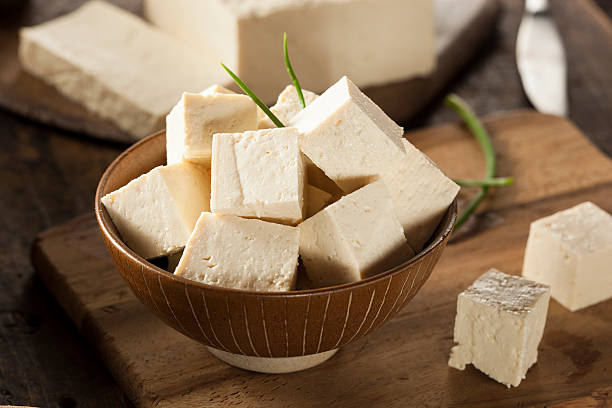
Lentils: The Versatile Legume
When it comes to versatility, lentils reign supreme in the realm of legumes. Whether you prefer red, green, or brown varieties, these tiny legumes pack a nutritional punch with each bite. With a robust flavor and hearty texture, lentils lend themselves well to soups, stews, salads, and curries, offering a substantial dose of protein along with fiber, folate, and other essential nutrients. Explore our collection of lentil-based recipes on WellHealthOrganic.com and discover creative ways to incorporate this powerhouse ingredient into your meal rotation.
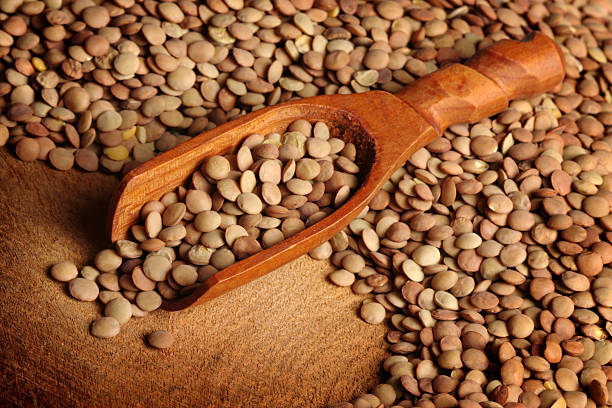
Beans: A Protein-Rich Pantry Staple
No vegetarian pantry is complete without an assortment of beans, and for good reason. Kidney beans, black beans, navy beans—each variety brings its own unique flavor and texture to the table, while offering a substantial source of plant-based protein. Whether you’re whipping up a batch of hearty chili, crafting veggie-packed salads, or molding flavorful bean burgers, beans serve as a versatile canvas for culinary creativity. Packed with protein, fiber, and an array of vitamins and minerals, beans are a must-have for anyone looking to nourish their body with wholesome, plant-based fare.
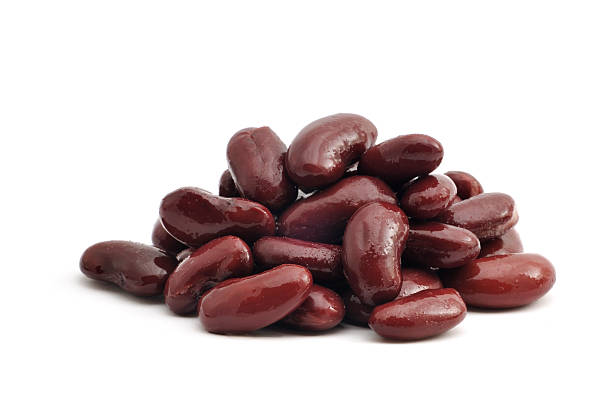
Chickpeas (Garbanzo Beans): The Mediterranean Marvel
Hailing from the Mediterranean region, chickpeas, also known as garbanzo beans, are a nutritional powerhouse beloved for their versatility and taste. Whether mashed into creamy hummus, crisped into golden falafel, or tossed into vibrant salads, chickpeas add a satisfying dose of protein, fiber, and flavor to any dish. Rich in folate, iron, and manganese, these legumes boast an impressive nutritional profile that supports overall health and well-being. Explore our collection of chickpea-centric recipes on WellHealthOrganic.com and elevate your culinary repertoire with the Mediterranean marvel that is chickpeas.
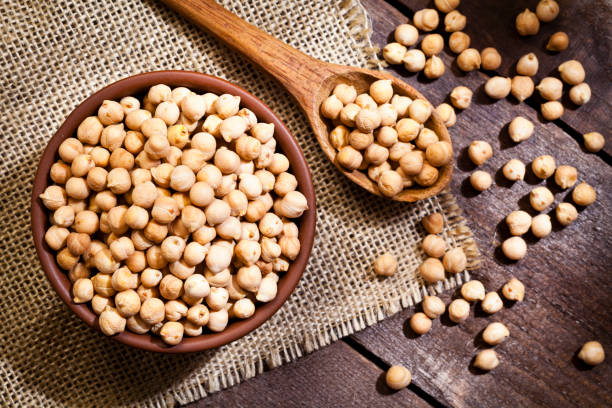
Quinoa: The Complete Protein
Quinoa, often hailed as a superfood, is a complete protein, meaning it contains all nine essential amino acids that the body cannot produce on its own. Native to the Andean region of South America, quinoa boasts a nutty flavor and delicate texture that pairs well with a variety of dishes. Whether served as a fluffy side dish, tossed into salads, or used as a base for hearty grain bowls, quinoa offers a nutrient-rich foundation for plant-based meals. Packed with protein, fiber, and essential nutrients like magnesium and iron, quinoa is a valuable addition to any vegetarian diet.

Nuts: Nature’s Nutrient-Dense Snack
In addition to being a convenient and satisfying snack, nuts are a nutrient-dense source of plant-based protein, healthy fats, and an array of vitamins and minerals. Almonds, peanuts, pistachios, cashews—each nut variety brings its own unique flavor profile and nutritional benefits to the table. Whether enjoyed on their own, sprinkled over salads, or blended into creamy nut butters, nuts are a versatile ingredient that adds texture, flavor, and nutritional value to a wide range of dishes. Explore our selection of nut-based recipes on WellHealthOrganic.com and harness the power of nuts to fuel your plant-based lifestyle.
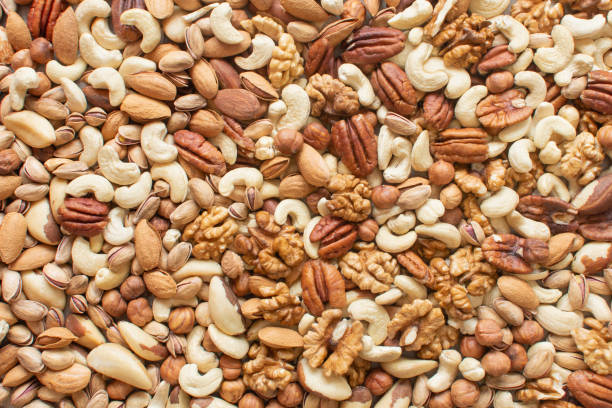
Common Vegetarian Protein Sources In Indian Households
1. Legumes: Beans, Lentils, and Peas
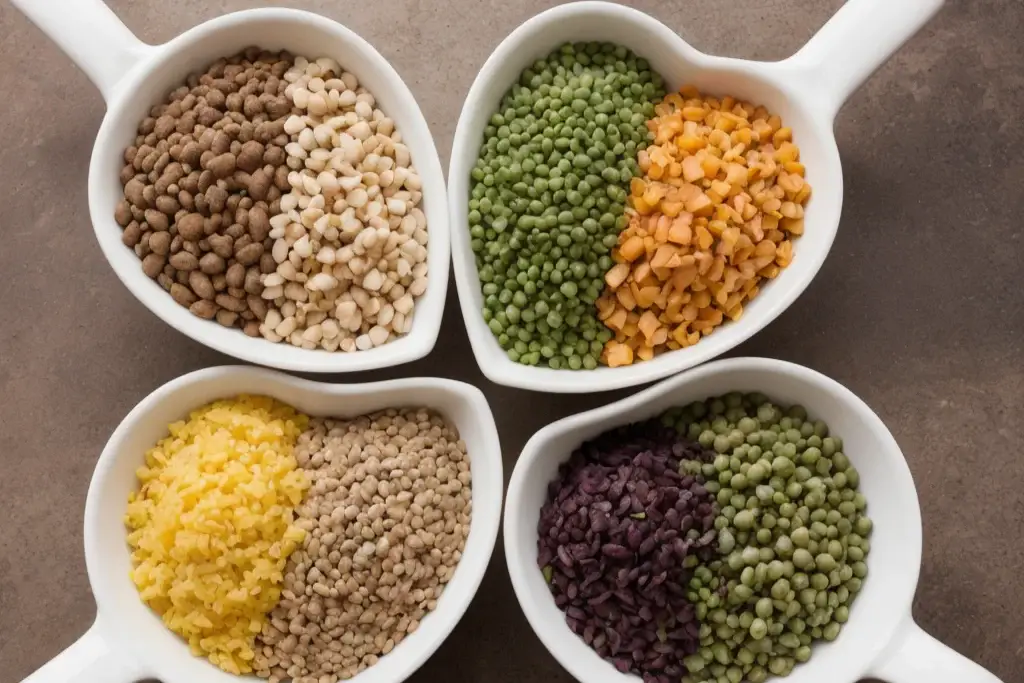
Legumes are a powerhouse of protein, fiber, and various nutrients.
Research published in the Journal of the Academy of Nutrition and Dietetics highlights legumes as not only a rich source of protein but also beneficial for our heart health and diabetes prevention.
Nutritional Profile of Common Indian Legumes: Vegetarian Protein Sources
| Item | Protein Content (per 100g) | Calories (per 100g) | Fiber Content (per 100g) | Important Micronutrient |
|---|---|---|---|---|
| Kidney Beans | 8.9g | 127 | 6.4g | Folate |
| Black Gram | 25g | 341 | 4.8g | Iron |
| Green Peas | 5g | 81 | 5.1g | Vitamin C |
| Chickpeas | 19g | 364 | 17g | Iron |
| Mung Beans | 24g | 347 | 16.3g | Folate |
| Red Lentils | 26g | 116 | 7.9g | Folate |
| Soybeans | 36g | 446 | 9.3g | Iron |
2. Quinoa: The Complete Protein
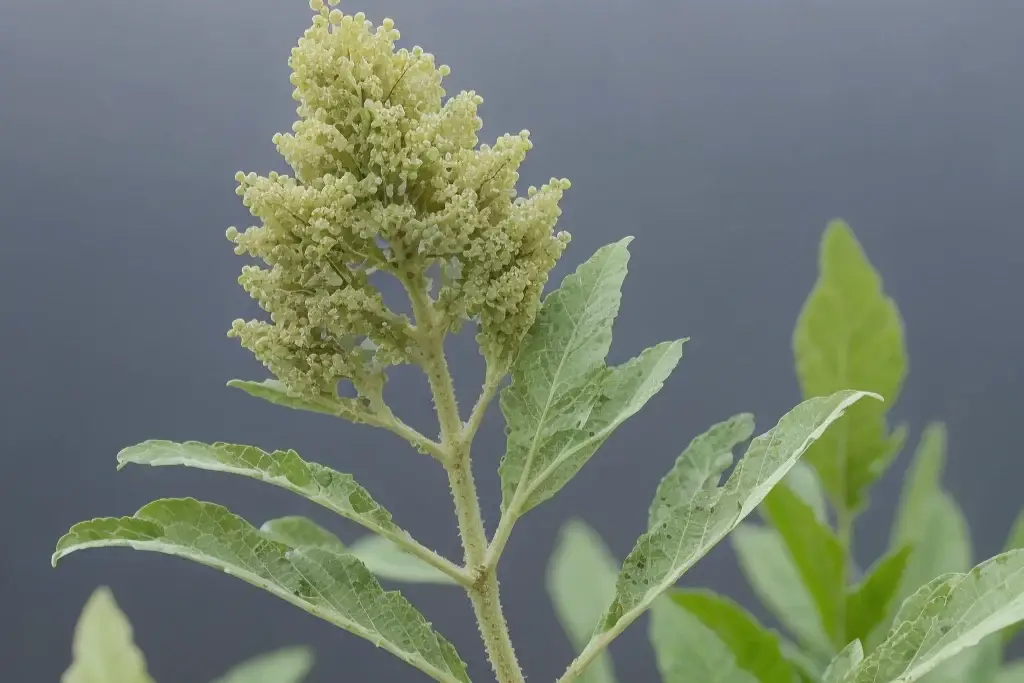
Unlike many plant proteins, quinoa seeds are considered a complete protein, containing all nine essential amino acids.
A study in the Journal of Current Opinion in Food Science points out quinoa’s protein quality and its role in improving the nutritional content of a vegetarian diet.
Nutritional Content of Quinoa: Vegetarian Protein Sources
| Nutrient | Amount per 100g |
|---|---|
| Protein | 4.4g |
| Calories | 120 |
| Fiber | 2.8g |
| Magnesium | 64mg |
| Iron | 1.5mg |
| Calcium | 17 mg |
3. Nuts and Seeds: Compact Nutrient Dynamos
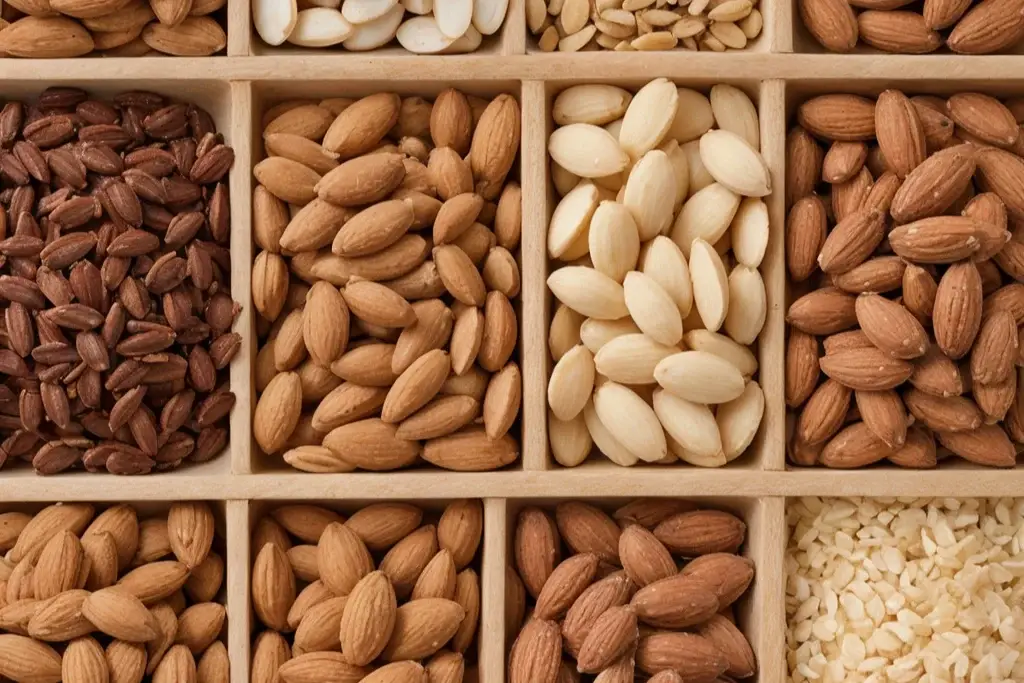
Nuts and seeds are not only protein-rich but also provide healthy fats, vitamins, and minerals. Almonds, for example, offer around 6 grams of protein per ounce.
The Americal diabetes association notes that incorporating nuts into your diet can lower the risk of cardiovascular disease.
Nutritional and Health Benefits of Common Nuts and Seeds: Vegetarian Protein Sources
| Nut/Seed Type | Protein Content per 100g | Health Benefits |
|---|---|---|
| Almonds | 21.4g | High in Vitamin E, reduces heart disease risk |
| Walnuts | 14.6g | Rich in Omega-3, supports brain health |
| Pistachios | 20.5g | Lowers LDL cholesterol, good for heart health |
| Cashews | 17.4g | Magnesium-rich supports heart and liver health |
| Flaxseeds | 18g | High in Omega-3 fatty acids, anti-inflammatory |
| Pumpkin Seeds | 30g | Magnesium-rich, supports heart and liver health |
| Chia Seeds | 17g | High in fiber, promotes weight management |
4. Soy Products: Tofu, Tempeh, and Edamame
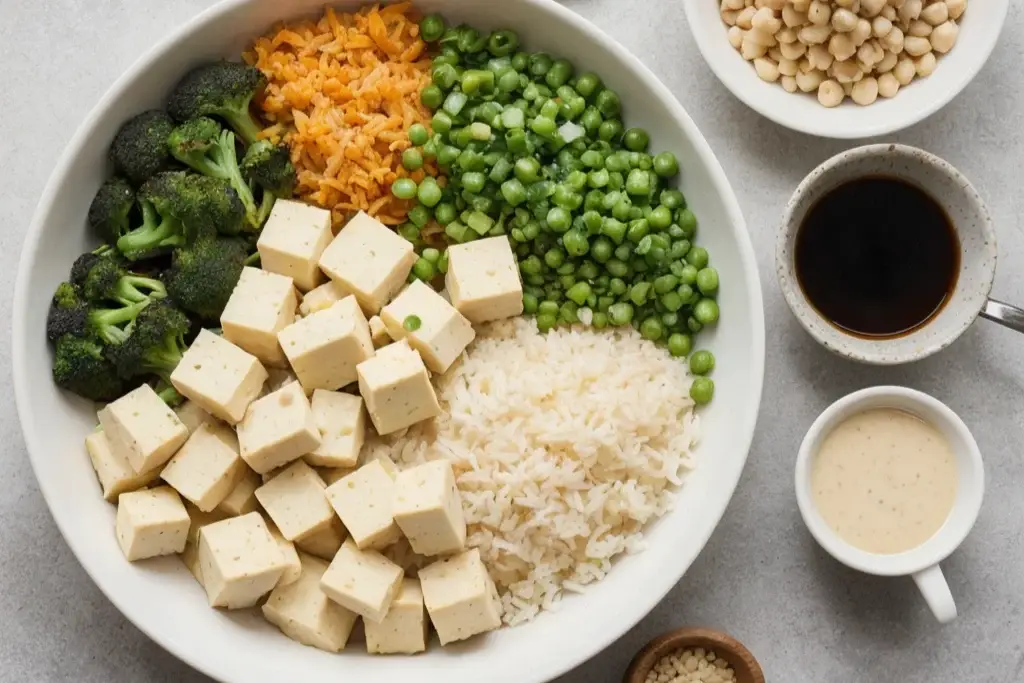
Soy products are versatile, high in protein, and can be great meat substitutes. Tofu, for instance, packs about 10 grams of protein per half-cup serving.
A report published in the American Journal of Clinical Nutrition supports soy’s role in a healthy vegetarian diet, emphasizing its nutritional benefits and versatility.
Wellhealthorganic Vegetarian Protein Sources:
Nutritional Profile and Benefits of Common Soy Products: Vegetarian Protein Sources
| Soy Product | Protein Content per 100g | Calories per 100g | Key Nutrients | Dietary Benefits |
|---|---|---|---|---|
| Tofu | 17g | 144 | High in calcium and iron | Supports bone health, good for heart health |
| Tempeh | 20g | 192 | Rich in protein and fiber | Aids digestive health, beneficial for muscle growth |
| Edamame | 12g | 121 | High in fiber, vitamin K, folate | Lowers cholesterol, may help in blood pressure management |
5. Dairy Products: Cheese, Yogurt, and Milk
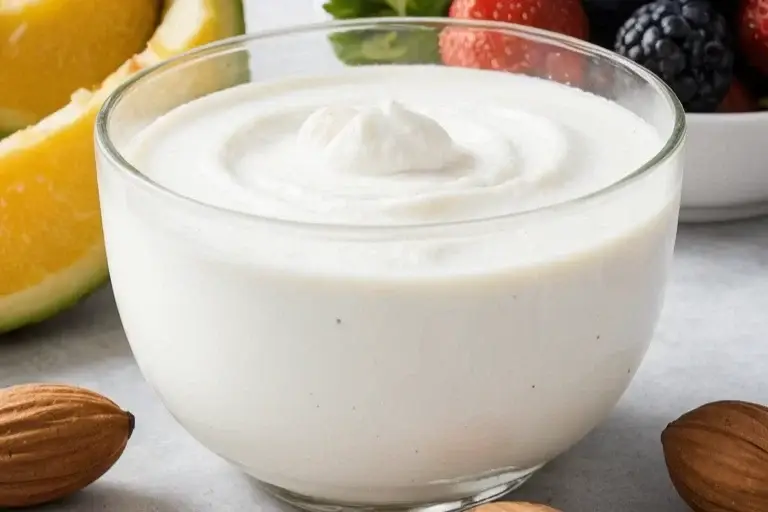
For lacto-vegetarians, dairy products are a significant protein source. Greek yogurt can contain up to 20 grams of protein per cup.
Research published in the journal Nutrients outlines the role of dairy in providing high-quality protein and essential nutrients.
Nutritional Profile of Common Dairy Products: Cheese, Yogurt, Buffalo Milk, Cow Milk and Goat Milk: Vegetarian Protein Sources
| Dairy Product | Protein Content per 100g | Calories per 100g | Key Nutrients | Health Benefits |
|---|---|---|---|---|
| Cheese | 25g | 429 | High in calcium, phosphorus, Vitamin B12 | Supports bone health, and may lower blood pressure |
| Yogurt | 3.5g | 61 | Rich in calcium, probiotics, Vitamin B2, Vitamin B12 | Supports digestive health, boosts immune system |
| Buffalo Milk | 4.3g | 117 | Higher in fat, calcium, and protein than cow milk | Supports bone strength, more beneficial for growth |
| Cow Milk | 3.2g | 67 | High in calcium, Vitamin D, potassium, Vitamin B12 | Supports bone health, may lower blood pressure |
| Goat Milk | 3.3g | 72 | High in calcium, phosphorus, and essential fatty acids | Supports digestive health, enhances nutrient absorption, often easier to digest than cow’s milk. |
Conclusion
Vegetarian protein sources offer a plethora of nutritional benefits and culinary possibilities, allowing you to nourish your body with delicious and wholesome foods while supporting your health and well-being. By embracing plant-powered protein, you can enjoy a diverse and satisfying diet that promotes vitality and longevity. Visit WellHealthOrganic.com for more tips on vegetarian nutrition, recipes, and holistic wellness.

